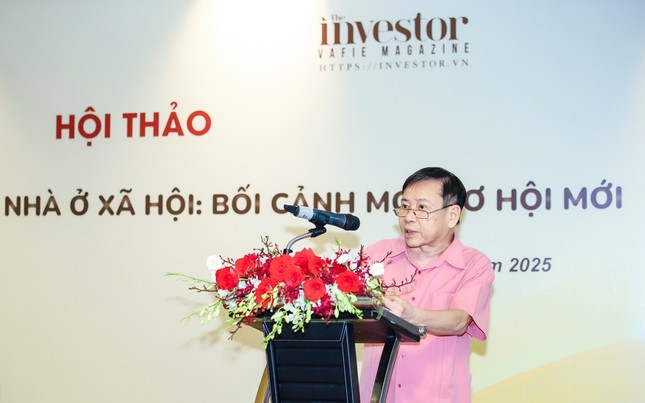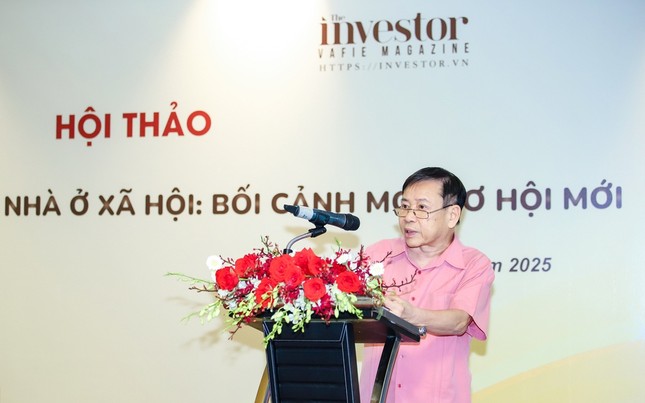Tackling Social Housing Bottlenecks
At the seminar “Investing in Social Housing Development: New Context, New Opportunities” on May 27, Mr. Nguyen Van Khoi, Chairman of the Vietnam Real Estate Association, emphasized the importance of social housing in the country’s development strategy for the period of 2025-2045.
According to Mr. Khoi, real estate is one of the “measures” of socio-economic development, and social housing must be a pillar rather than just a slogan.

Mr. Nguyen Van Khoi, Chairman of the Vietnam Real Estate Association.
However, the current reality shows that social housing remains hindered by many barriers. From 2021 until now, there have only been 679 social housing projects implemented nationwide, with a scale of about 623,051 units, achieving about 48% of the target set for 2025. Localities have not integrated social housing targets into their annual and five-year socio-economic development plans, along with a series of unresolved mechanism and policy inconsistencies.
As an example, Mr. Khoi said that the regulation of a 10% profit limit in the context of input material price pressures, frequent labor fluctuations, and legal entanglements is making many investors cautious.
In addition, some provincial-level localities have not allocated budgets for compensation, support, resettlement, site clearance, and the creation of clean land funds for investors…
According to Mr. Khoi, the 2023 Housing Law and Decree 100/2024 have empowered localities in allocating social housing land funds, with three forms: allocating 20% of the area in commercial projects, allocating in other areas, or paying an amount equivalent to the land value. However, the unclear conditions for application have confused localities, forcing many investors to apply the first option – creating financial and implementation pressures.
Furthermore, the land fund for social housing construction is currently located far from the center, with inadequate infrastructure and inconvenient transportation. There is a lack of specific guidance on procedures and land values for enterprises that own land funds and wish to convert their purpose for social housing development, leading to bottlenecks in implementation.
In terms of administrative procedures, the leader of the Vietnam Real Estate Association said that the procedures related to social housing – from investment policies to construction permits – are still complicated and lacking in synchronization, prolonging project implementation time, with many places taking more than two years to complete site clearance.
Another bottleneck hindering the development of social housing is the lack of accessible capital. As a result, many short-term credit support packages are unsustainable due to a lack of diverse capital sources and a lack of state budget capital. Meanwhile, high commercial lending rates and short loan terms discourage both investors and homebuyers.
Not only businesses but also low-income people find it difficult to access preferential loans due to financial proof conditions.
“Borrowers are only supported up to 80% of the apartment value, and the rest must be self-funded – which not everyone can afford. Even freelancers face challenges due to a lack of local guidance on income confirmation, hindering the home-buying process,” emphasized Mr. Khoi.
Additionally, there are still cases of “middlemen” in social housing, buying and selling at a premium, causing market chaos and frustration for buyers.
Strategies for Overcoming Challenges
Ms. Tong Thi Hanh, Director of the Housing and Real Estate Market Management Department of the Ministry of Construction, also acknowledged that the results of the recent proposal for one million social housing units did not meet expectations and identified several reasons.

Ms. Tong Thi Hanh, Director of the Housing and Real Estate Market Management Department, Ministry of Construction.
First, in terms of implementation, the Ministry of Construction has been coordinating with localities and businesses to remove obstacles as much as possible. In addition, there are institutional obstacles, and businesses face more difficulties and complexities in implementing social housing projects compared to commercial housing projects. Second, the investment procedures for social housing construction are complicated and time-consuming. Third, preferential and supportive policies are difficult for businesses to access. Fourth, while there are preferential policies for investors in social housing development, the rental housing fund has not developed.
Ms. Hanh shared that the draft National Assembly Resolution on social housing aims to reform and simplify administrative procedures to facilitate businesses in completing their projects.
Accordingly, the implementation procedure is expected to take a maximum of 75 days, reducing about 200 days, equivalent to about 70% of the implementation time compared to the current regulations. In addition, social housing projects currently have to go through sequential procedures: establishing, appraising, and approving planning tasks; and establishing, appraising, and approving planning schemes.
Through the review and synthesis of practical difficulties, many localities proposed not to perform the step of establishing, appraising, and approving the planning task but to use the planning land-use criteria and the requirements for spatial organization, architecture, and landscape of the area specified in the approved subdivision or master plan, replacing the planning task.
To shorten the time for implementing social housing investment projects, it is necessary to eliminate the step of establishing, appraising, and approving the planning task…
A Homebuyer’s Nightmare: From Waiting in Vain to Falling Prey to Scammers
After a long wait, several social housing projects in Hanoi have finally commenced. Though these projects are not yet officially on the market, thousands of prospective buyers are already lining up to submit their applications. The process of applying for these much-needed homes is a challenging journey, with many resorting to paying extra fees to agents or “middlemen” to facilitate their applications.
An Khang Homes – The Official F1 Dealer for Sun Group’s Blanca City Vung Tau Project
On the morning of May 20, at Gem Center (Ho Chi Minh City), Sun Group and An Khang Homes, two prominent real estate developers, joined forces in a strategic distribution partnership for the Vung Tau-based mega coastal urban project, Blanca City. This collaboration marks a significant step towards a sustainable future for both companies in the vibrant beach city of Vung Tau.





















